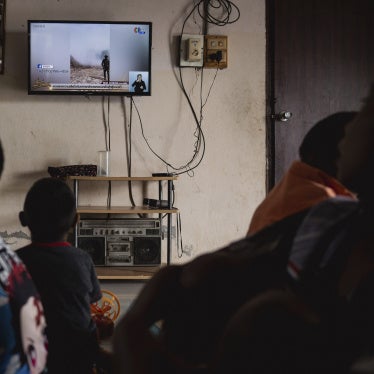(New York) - The Pakistani government must immediately release thousands of supporters of the opposition Pakistan Peoples Party (PPP) arbitrarily arrested in a countrywide crackdown last week, Human Rights Watch said today. PPP supporters were arrested in order to prevent them from greeting Asif Zardari, PPP leader and husband of former Prime Minister Benazir Bhutto, on his return from a trip to Dubai to meet his family. Zardari was released on bail last November after spending eight years in prison without a conviction.
The wave of arrests began on April 14 to prevent supporters from gathering at Lahore Airport to receive Zardari on April 16. Thousands of PPP supporters were arrested across Punjab and in the southern province of Sindh. Others were prevented by police and military intelligence personnel from crossing the provincial border into Punjab from Sindh and Pakistan-administered Kashmir.
PPP supporters who managed to reach the Lahore party headquarters near the airport and the airport itself were dragged away by the police. Police beat and manhandled many supporters, including women, when they attempted to chant slogans or protest police brutality. At least three women were severely injured and have been hospitalized.
“General Musharraf talks of ‘enlightened moderation’ and says he is moving towards full democracy,” said Brad Adams, Asia director at Human Rights Watch. “But democracies don’t use force to prevent peaceful gatherings. There is nothing enlightened or moderate about arresting thousands of people who merely want to participate in the country’s political process.”
The non-governmental Human Rights Commission of Pakistan (HRCP) also reported police violence. Asma Jahangir, a United Nations human rights special rapporteur and HRCP chairperson, was denied access to police stations where detainees were being held despite repeated requests.
Some journalists were detained at the airport for several hours and their equipment confiscated. Other reporters faced intimidation in attempting to cover events in a city effectively cordoned off by thousands of police personnel. Cell phones and camera equipment of journalists accompanying Zardari were snatched and footage destroyed.
Those arrested included members of the PPP leadership, including several PPP members of parliament. The provincial government has offered to release PPP members of parliament from custody, and some 600 party activists have been bailed, but thousands more remain in custody without charge in Punjab and Sindh province.
The Punjab provincial government imposed the discredited colonial era law, Section 144 of the Criminal Procedure Code, which prevents gatherings of four or more people, in order to prevent the gathering. The Punjab police, acting on orders from the provincial government, set up police checkpoints and roadblocks on routes leading into the city, and within Lahore, to block access to the airport and restrict movement in the city. Prime Minister Shaukat Aziz, speaking on behalf of the federal government, expressed support for these measures.
“The Pakistani government must immediately release those arrested and stop using outdated, repressive laws to stifle political expression,” said Adams. “The government must also take action against police officers and government officials responsible for using excessive force to prevent a peaceful political gathering.”
The PPP had made it clear that the event was not a protest rally. Political observers believe the crackdown resulted from a deadlock in negotiations between the Musharraf government and Bhutto’s PPP over a potential power-sharing arrangement. The military wants the PPP to accept Musharraf’s continued dual role as president and army chief and also insists on Bhutto’s “non-participation” in the political process, including in elections due in 2007.
In an interview with Reuters news agency on April 14, Musharraf, indicated his displeasure with the proposed reception for Zardari in the absence of an understanding with the PPP. Asked if he was willing to meet Bhutto in order to promote reconciliation, he said: “That time has not come as yet…At the moment it’s not right at all.” The crackdown followed the statement.
“General Musharraf seems to think that coercing the opposition into accepting his rule will grant him legitimacy,” said Adams. “But in a democracy, participation in the political process is determined by the rule of law, not by military diktat.”







